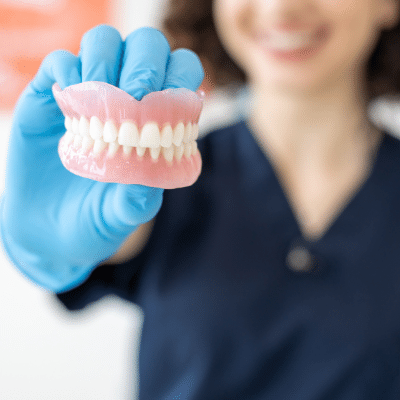
 |
An accident, disease, getting older, or poor oral healthcare may leave you with only a few healthy teeth or none at all. Missing teeth can cause a number of issues, such as gum disease, shifting, and tooth decay. Whether you are considering getting dentures, already have them, or know someone with them, it's very likely that you may have some questions about them. Read on to learn more about the various types of dentures available and which type may be suitable for you.
What are Dentures?
Dentures are custom-fitted, artificial replacements for missing teeth and the surrounding gum tissue. Constructed with either plastic prosthetic or porcelain teeth, dentures are removable and provide relatively affordable options for teeth replacement.
Your dentist would usually take impressions of your jaw after tooth loss or removal and create wax denture models, which are tested to ensure optimal comfort and alignment. The denture is then cast and made ready for use. Ongoing adjustments are made as needed.
Benefits of Dentures
Dentures can help improve the appearance of a smile that has multiple missing teeth and also maintain the structure of the mouth by supporting the structures around the cheeks and lips. Dentures also help you chew food normally, making it possible for you to keep your regular diet. Finally, they are a viable solution to replace teeth that are causing serious pain or oral health issues, such as those with rotted roots or are severely damaged. Having dentures fitted means that troublesome teeth are eliminated and replaced with a strong and aesthetically pleasing alternative.
Types of Dentures
Regardless of what kind of dentures you may have, all dentures need to be cleaned daily, just like regular teeth to prevent tartar and plaque build-up. You can clean your denture by running water over them to dislodge any food particles that may be stuck between the teeth, then brush them with a denture brush or a very soft toothbrush using a mild soap or denture cleaner.
Remember to always remove your dentures before sleeping to avoid damaging them, dislodging them, and giving your gums some time to relax. Submerge your dentures fully in warm water to keep them from drying out and becoming misshapen.
Wondering which kind of dentures are right for you? If you have any questions or concerns, book a consultation appointment with us today! The types of dentures and treatment options available will be explained to you during your consultation and your dentist will help determine the best treatment options after your examination.